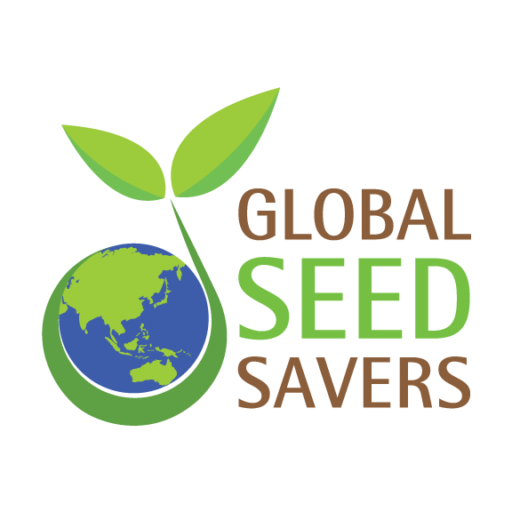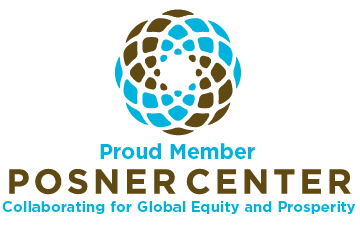Our Roots
the foundation of our work and the people Guiding and driving our programs and advocacies
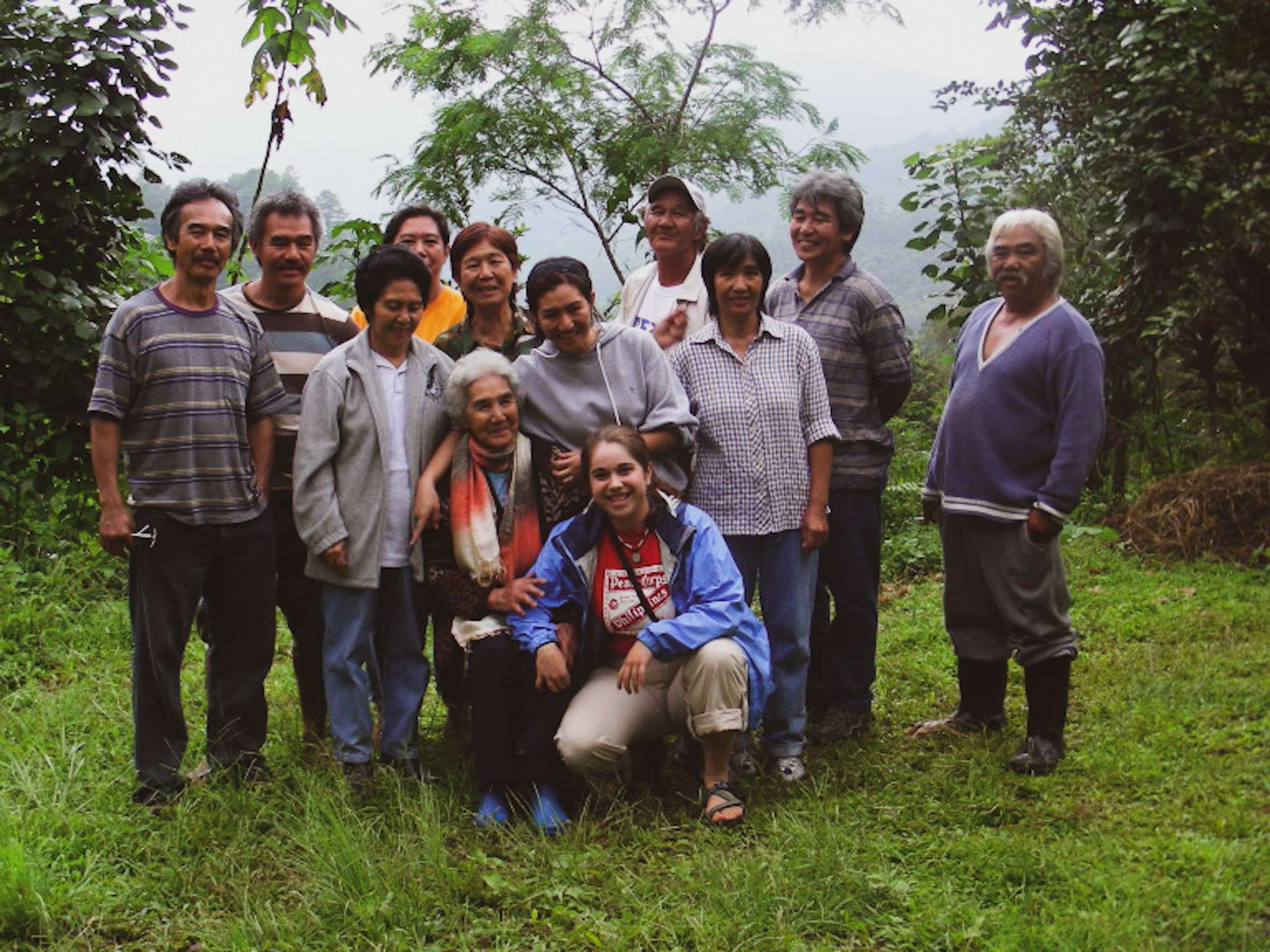
Sherry with the Cosalans at ENCA Farm in 2008.
Table of Contents
Our Why
The Story of Farmers
Seed Sovereignty
Food Security, Food Sovereignty, and Food Justice
Biodiversity Preservation
Climate Adaptation
Culture Preservation
Our Origin Story
Founded in 2010 as Friends of ENCA Farm by Sherry Manning, a Returned Peace Corps Volunteer and adopted daughter of the town of Tublay, Global Seed Savers began its history as the educational and advocacy entity supporting the work of ENCA Eco-Tourism and Organic Farm located in Tublay, Benguet Province.
In 2016, we made the decision to grow beyond the historic ENCA Farm and began expanding our programming to additional communities and more farmers. This decision has allowed us to grow our impact and reach many more farmers throughout the Philippines.
In October 2017, we changed our name to Global Seed Savers to better reflect our growing work and impact. At the same time, Global Seed Savers-Philippines received its registration as a Philippine NGO with the Securities and Exchange Commission.
What started with one family farm has grown into a nationwide movement with communities across the Philippines returning to growing their own food and ending their dependence on purchasing seeds after each planting…by restoring this ancestral wisdom and returning the power of their food systems into communities hands!
In the next sections, we will discuss what seed sovereignty is, why it is important, and why it is the key to the emergence of a truly sustainable agriculture.
Seeds being dried.
Our Why
About 90% percent of the world’s farms are owned and operated by families.[1]https://www.fao.org/family-farming/themes/small-family-farmers/en Most of these farms are small and are often found in rural areas of developing countries such as the Philippines. According to the Food and Agriculture Organization (FAO) of the United Nations, 70% of all food consumed worldwide come from these small family farms.
But did you know that many of these small holder farmers are food insecure?
There are a number of factors that have led to this issue: shrinking farm sizes and farmers leaving the agriculture sector, increasing cost of food production, and the unpredictability of the changing climate.
Today, there is an increasing need for a sustainable agricultural system that will help us tackle the triple challenge of producing more food, creating more jobs, and preserving our natural resources. For us at Global Seed Savers, small family farmers, equipped with the seeds and the agricultural knowledge they have inherited from their parents and grandparents, lie at the heart of the solution.
The Story of Farmers
At Global Seed Savers we believe and have seen that our farmer partners are the backbone of their communities! Our partners are dedicated stewards of their lands, seeds, food traditions, and cultural practices, and they work hard daily to feed their families, communities, and indeed the world!
This is all while living with the first hand challenges and realities of: climate change, the influx of middlemen cutting them off from direct sales of their products and therefore less income generating opportunities, and limited access to being at the decision making table for policies that impact their daily lives. These challenges are real and ever present but we see on a daily basis how our farmer partners continue to rise above these challenges and build a better future.
Farmers are often faced with the lack of opportunity for higher income, and they have limited access to markets and farm services. Voices of farmers are rarely included in economic planning. Agricultural development is at the bottom of the government’s list, as reflected by the very small allotment (2% of the national budget) received by the sector.
The challenges farmers have had to face are no small feat. They have had to learn to deal with the almost-regular devastation of their farms due to typhoons. They have had to learn to recover from these devastations without the support of the government. They have had to shoulder increasing costs of food production in the face of consistently decreasing farm gate prices.
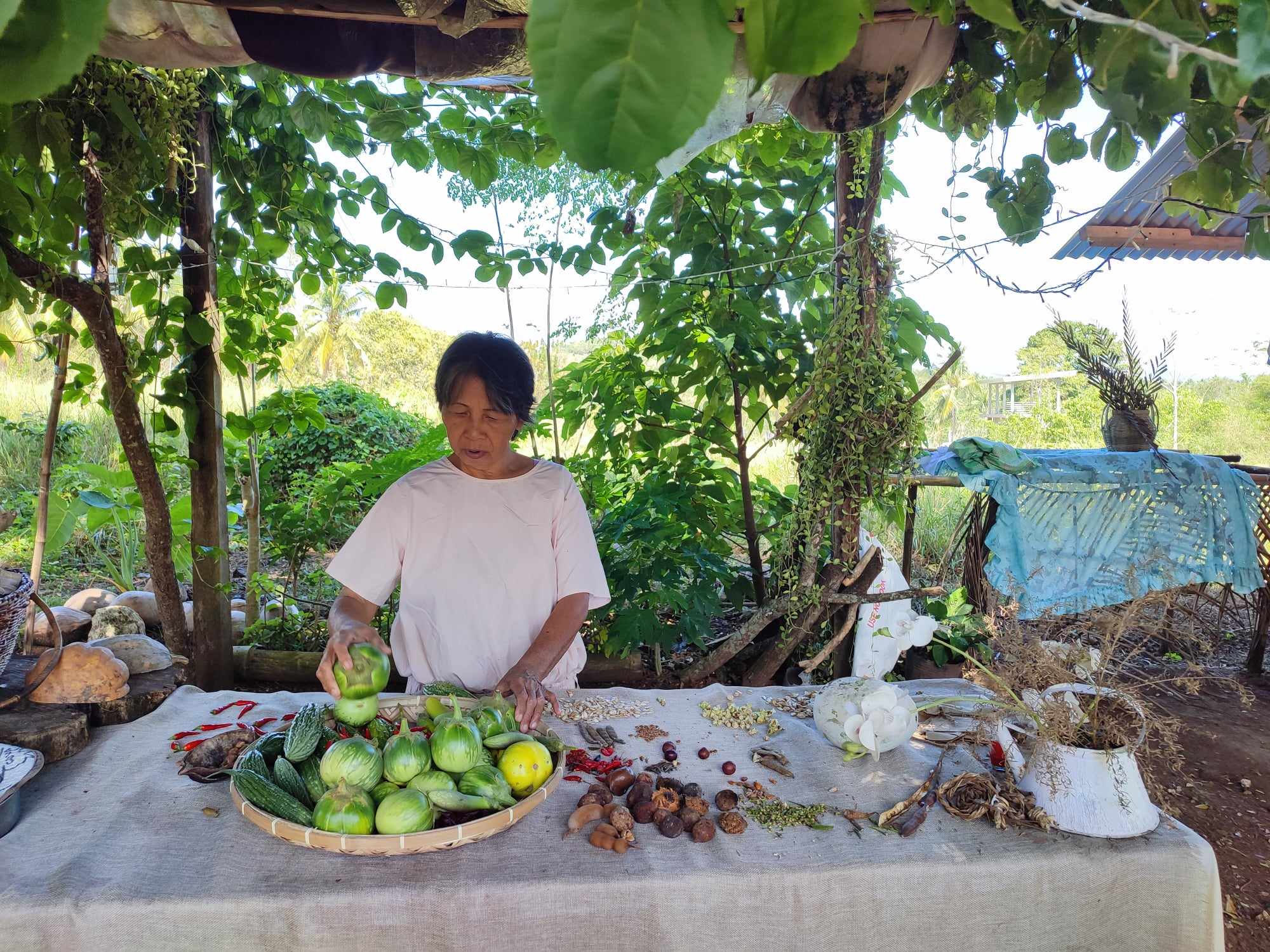
Ate Butche dedicated farmer and chef from Catmon, Cebu
What if there was a way to help farmers deal with these realities without having to sacrifice their cultures and identities?
Farmers have had to adopt strategies to deal with these challenges which have, unfortunately, forced them to sacrifice the very legacy passed on to them by their parents and grandparents – protection of the environment, preservation of biodiversity and culture, and the respect for life.
Through the experience of various indigenous peoples around the world, we have found the solution: the control of high-quality, regionally-adapted, open-pollinated, and naturally-produced seeds.
Seeds are the foundation of life, and protecting them means protecting variety and history in our food system.[2]https://www.bard.edu/cep/blog/?p=12991
Seed Sovereignty
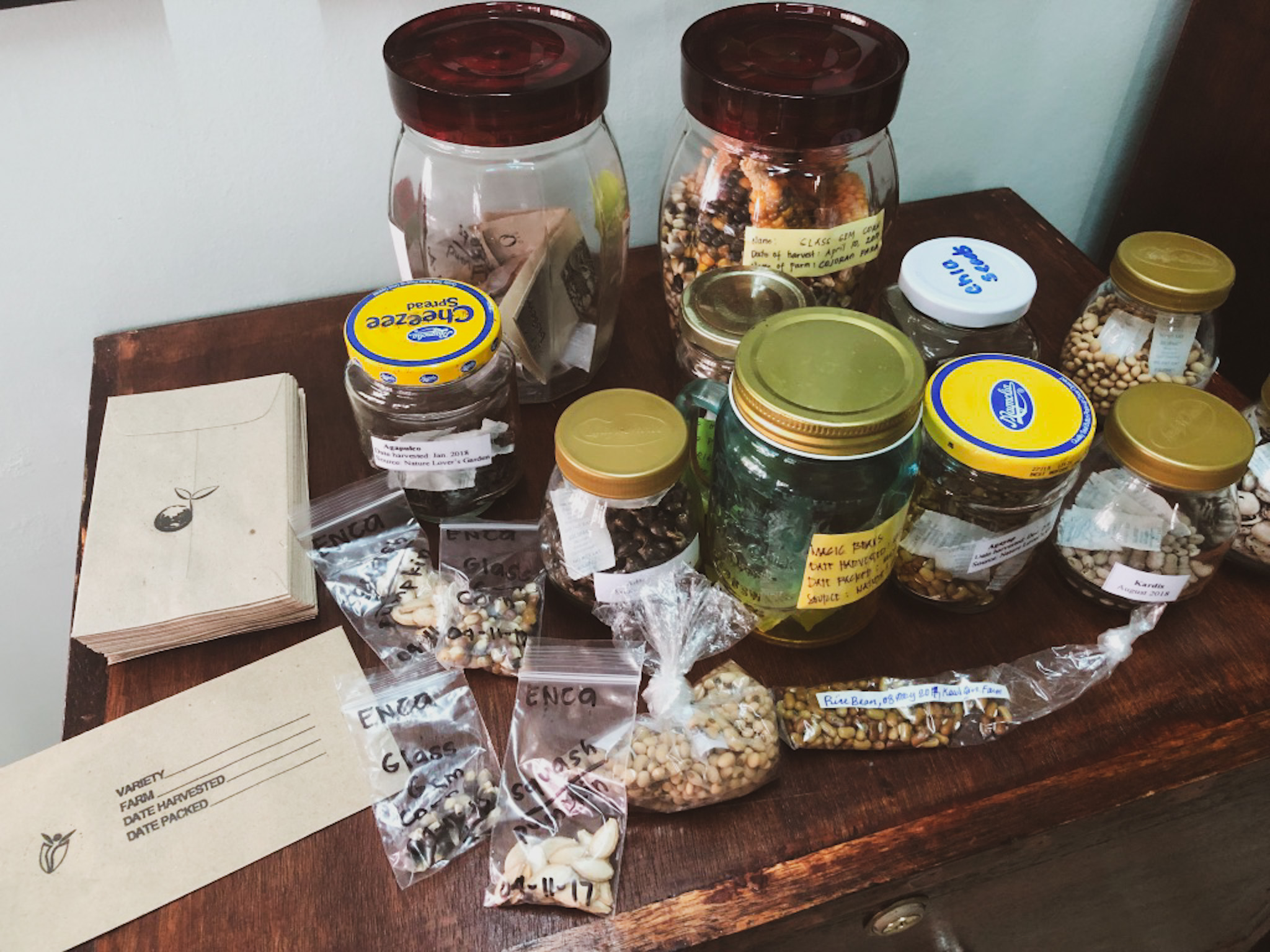
Seeds from Tublay.
Seed sovereignty is defined as “the right of a farmer to save, use, exchange and sell his or her own seeds.”[3]https://newearth.university/resources/what-is-seed-sovereignty-article/
Seed sovereignty is important for several reasons:[4]https://www.greenpeace.org/africa/en/blogs/11658/how-to-guide-5-seed-sovereignty-and-saving/
- It is the basis to maintaining biodiversity as well as food security.
- High-quality open source seeds that can be easily produced at a low cost reduces the cost of purchasing seeds.
- It allows farmers to produce their own seeds (seed self-reliance)
- It allows for the free exchange and sale of seeds among farmers.
- It enables farmers to select seeds suited to their environment. If one wants fruits that are big and are not attacked by pests in the garden, they can choose seeds of the plants that are grown in their garden with these specific traits.
- It enables the preservation of valuable traditional or indigenous seed varieties of vegetables for future generations.
Now one must remember that seed saving and seed sovereignty are two different things. Seed saving, as the name suggests, “is the process of saving seeds from one harvest for the subsequent harvest.”[5]https://www.firstnations.org/wp-content/uploads/publication-attachments/2015-Fact-Sheet-11-Seed-Saving-and-Seed-Sovereignty.pdf Seed saving is a necessity especially for Indigenous communities which relies on certain crops for consumption as well as for cultural and social purposes. Some indigenous communities have been able to develop systems of seed saving that would enable the best seeds to be viable for a long time.
The work of Global Seed Savers goes beyond seed saving. We use seed saving as a way to help preserve seed sovereignty by keeping seeds free of control mechanisms and making them available to farmers. The amount you pay for when you access the seeds we keep is not payment for the seeds, per se. Instead, it is your contribution to seed stewardship and your expression of support for the dream to keep seeds “a free, sovereign community asset that is passed down between generations and between friends”.[6]https://osseeds.org/control-of-seed-and-seed-sovereignty/
Seed sovereignty is the right of farmers to save, use, exchange and sell their own seeds.
Food Security, Food Sovereignty, and Food Justice
At Global Seed Savers, our goal is not just food security. Our goal is food sovereignty.[7]https://changeforchildren.org/wp-content/uploads/2016/06/Food-Security-vs-Food-Sovereignty.pdf
Conversations about development typically include food security, which is defined by the United Nations’ Committee on World Food Security as the capacity of people to “have physical, social, and economic access to sufficient, safe, and nutritious food that meets their food preferences and dietary needs for an active and healthy life”.[8]https://www.ifpri.org/topic/food-security
Most national plans pertaining to food security are myopic because these do not distinguish where food comes from, or how they are produced. What matters for them is that populations have access to food.
Unfortunately, most national food security targets are often met by sourcing food which are produced through environmentally destructive and exploitative processes, and supported by policies that destroy local food producers but benefit big, foreign agribusiness corporations.
Food Sovereignty: the right of peoples to healthy and culturally-appropriate food produced through ecologically sound and sustainable methods, and their right to define their own food and agriculture systems.
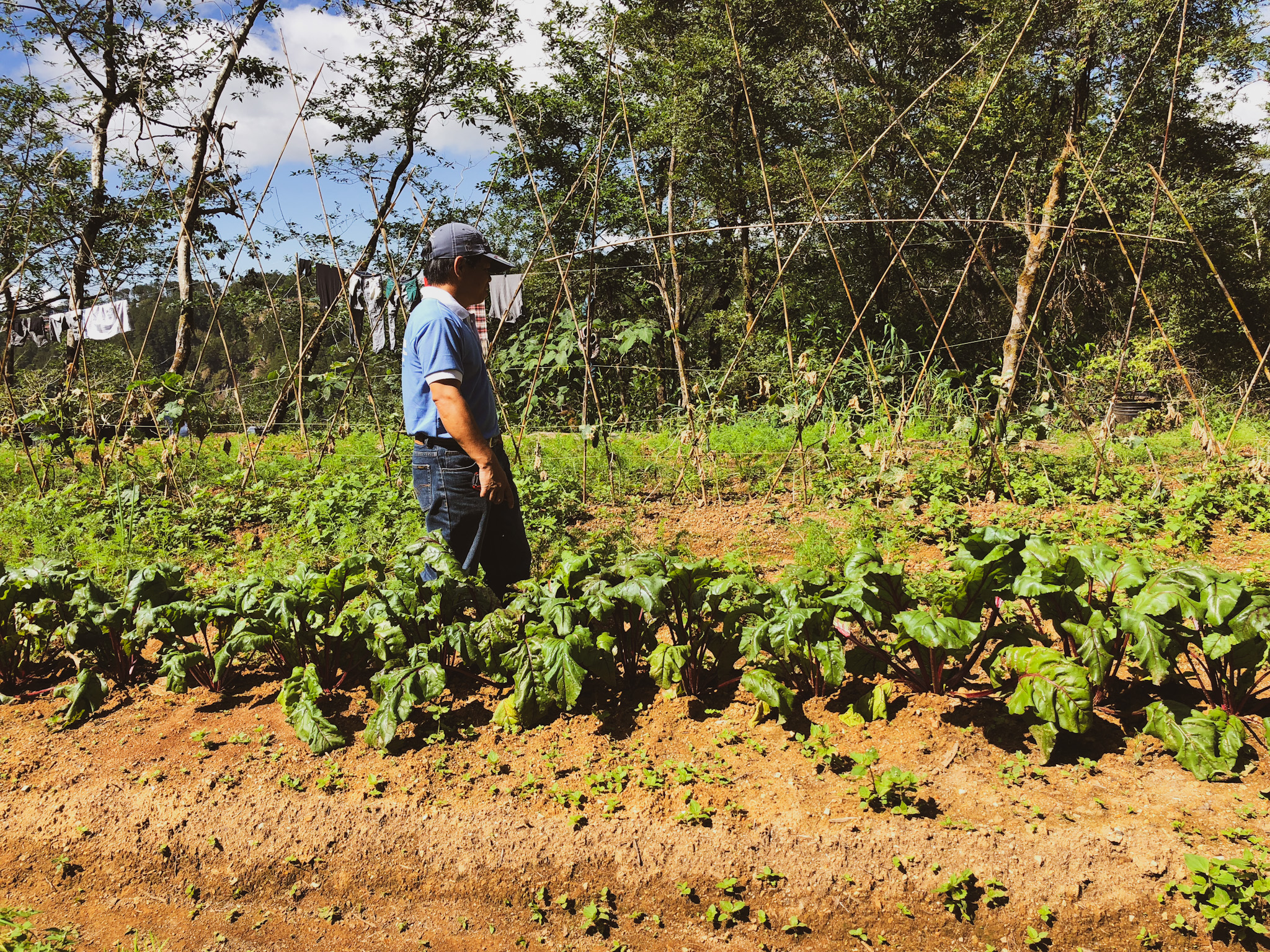
Farmer Pastor Jun inspecting his fields.
Food sovereignty ensures that communities have control over their productive resources, and that local food systems serve the collective aspirations of societies. It is less about food production for the sake of consumption, but more about empowering communities to meet its current need for food without compromising the capacity of future generations to meet their own needs.
Our work on food sovereignty has required us to adopt a new social relation which is free of oppression. Because farmers are at the center of our work, they are afforded with the value and respect that they deserve. For us, the protection of biodiversity is a key element of food production, and environmental protection is at the center of economic development.
Seed saving is an important element of food sovereignty because it enables communities to regain control over their seed and food supply, which means that they become less dependent on large seed corporations.
Biodiversity Preservation
According to estimates, 1-2% of crop diversity is lost every year, and this rate is accelerating as seed patenting and genetic engineering has prevented citizens from accessing, saving, and cultivating seeds they use for basic food production.[9]https://ysnews.com/news/2022/02/community-biodiversity-through-seeds This is worsened by the fact that commercial farmers have limited seed choices as 50 to 60% of commercial seeds today are controlled by just four seed companies.
Did you know that 75% of the crops present during the early 1900s have already disappeared?[10]https://en.reset.org/preventing-biodiversity-loss-through-seed-saving/ That is an enormous loss of genetic diversity. Plant varieties chosen for large-scale production by seed companies have pushed out varieties that were developed over many years based on flavor, resistance to pests, ability to withstand drought and other environmental stresses. Also, the various seed control mechanisms implemented by seed companies have led to the inability of commercial farmers to save seeds which in turn has prevented crops from adapting to their environments over generations of planting. This dependence on seed companies has diminished the biodiversity of the world’s food supply.
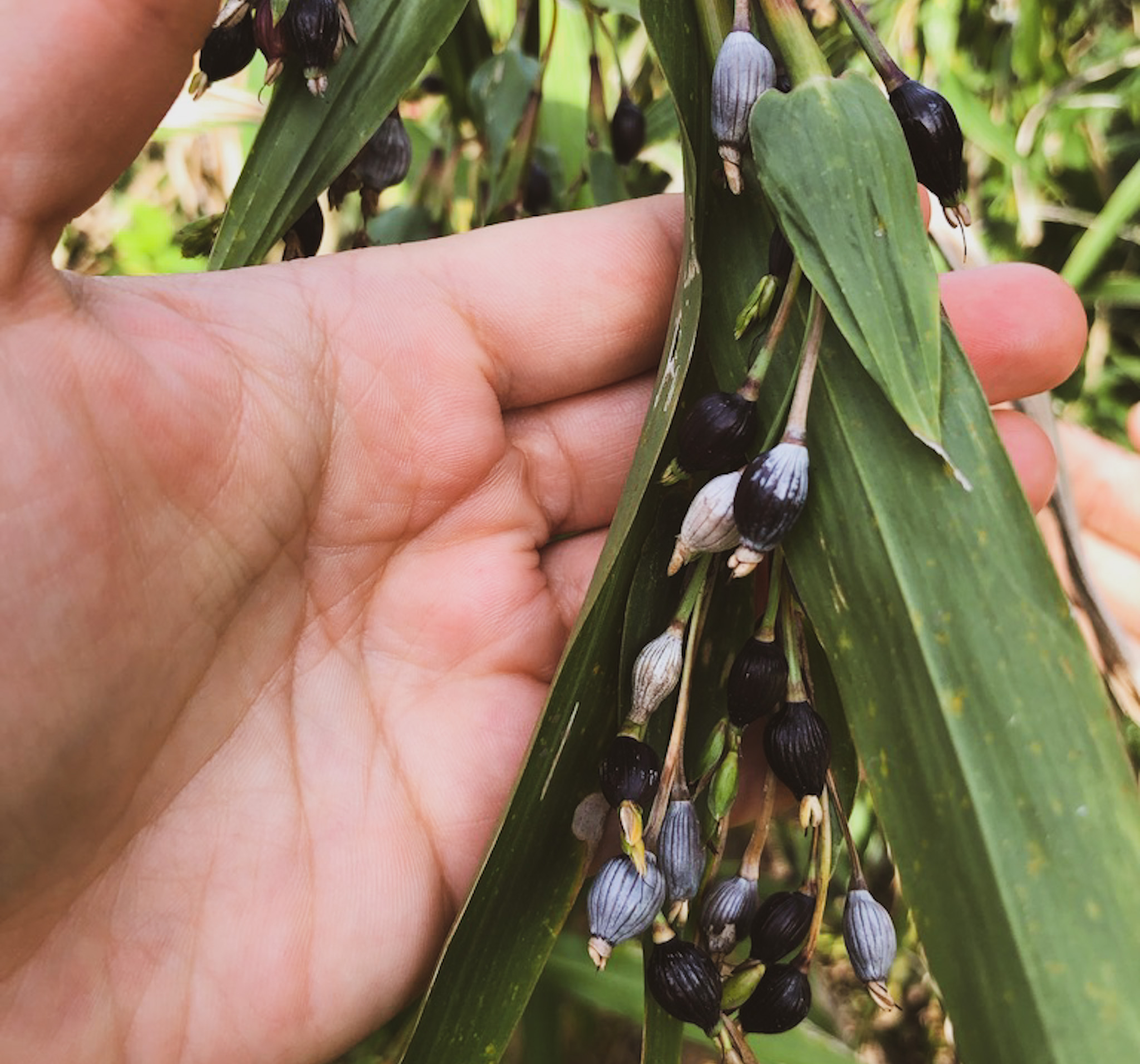
Adlai in Benguet.
By collecting and cultivating seeds from many forgotten plant varieties, we hope to preserve biodiversity in agriculture and bring back beauty, flavor, color, and variety in our food system.
Climate Adaptation
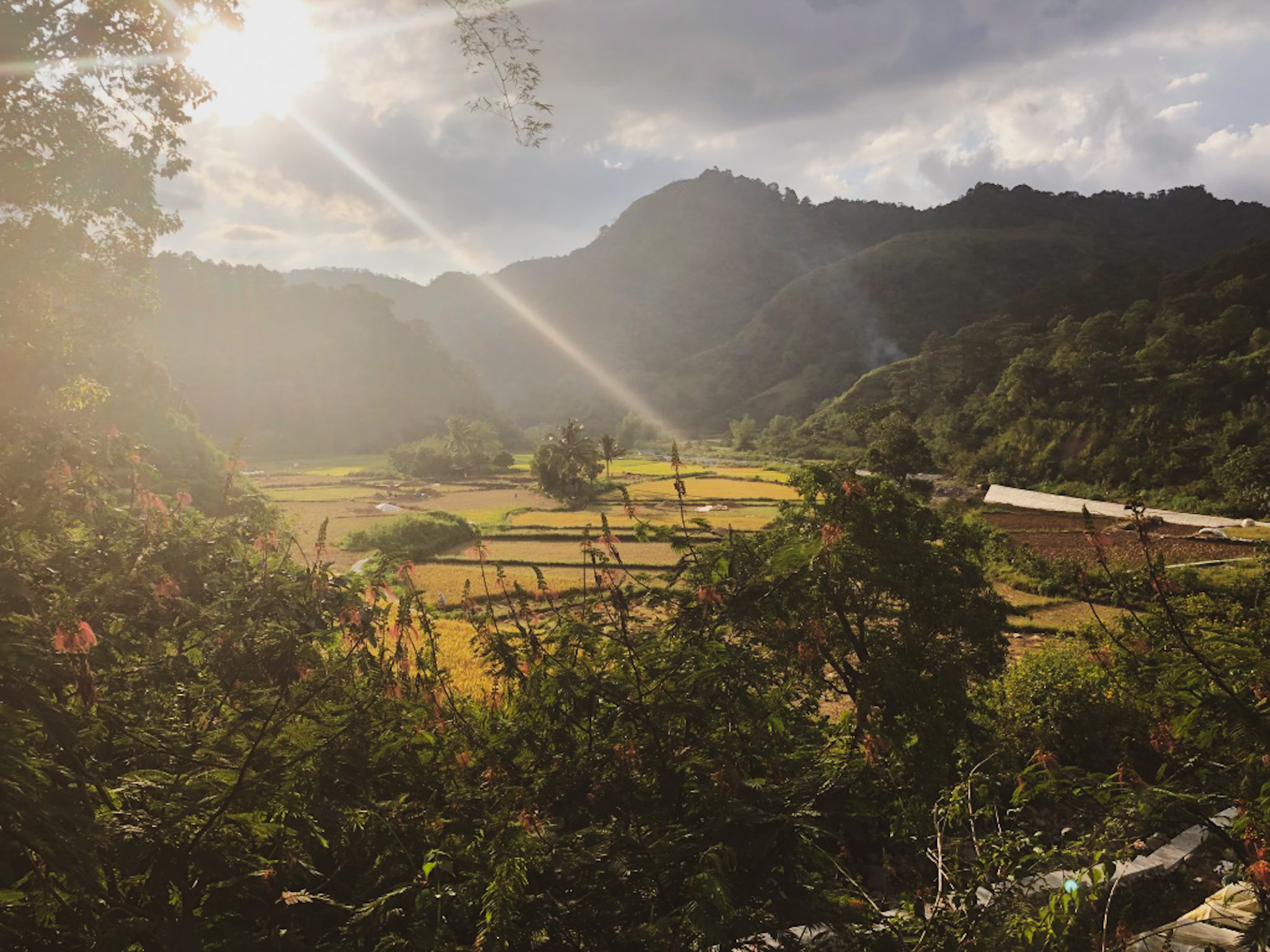
The beautiful Tublay landscape.
The growing of regionally-adapted seeds is parallel to that of supporting local food sources. It enables communities to reduce a community’s climate impacts while at the same time strengthening its food system in the face of growing climate uncertainty.
When farmers cultivate, select, and save local seed varieties each year, they are essentially allowing crops to constantly evolve according to the conditions in which they are planted. For example, a plant that has survived drought would produce new generations of plants that would be drought-resilient. In the same way, plant varieties that survived floods would produce new generations that are flood-resistant.
Unfortunately, commercial seeds produced by big seed companies do not offer this kind of climate-resilience. Hybrid seeds bred to withstand drought would not produce seeds that are true-to-type, which means that farmers would need to keep buying seeds, which in turn erodes their capacity to be sustainable. It also prevents them from earning a decent income as prices of agricultural produce in the market do not consider the cost of production, and are often dependent only on the supply and demand.
This is where seed libraries come in.
Community-based seed libraries can ensure improved access and availability of diverse, locally-adapted crop varieties. More than this, seed libraries have also become a venue for sharing and enhancing agriculture-related indigenous knowledge and skills in plant management, including seed selection, treatment, storage, production, and distribution.
Native seeds enable farmers to utilize more traditional agricultural methods that does not depend on pesticides, chemicals, and biotechnology. Native seeds also enable societies to think not only of the quantity, but also the quality of the food being produced.
Culture Preservation
In the same way that we, humans, shape and design the future of plants, plants have shaped and designed our societies. Consider the story of corn.
The maize (or corn) we know today is a product of several generations of random genetic mutations of the crop which was made possible only by humans repeatedly propagating the plant. In the same way, corn holds a sacred meaning for many cultures because it has enabled their communities to survive in the toughest of situations.
In the Mayan tradition, corn is at the center of community life as it binds the peoples with a sense of cultural unity and sacredness. Many rituals and ceremonies have been developed by that culture to honor the corn and to ensure that its seeds continue to exist among their people.
Among us Filipinos, the plant with the greatest connection to our culture is probably rice. Is it a surprise then if we say that Indigenous Peoples in the country have developed their rituals surrounding rice? The Ifugaos, for example, have twelve rice rituals, which are performed by a native mumbaki. These rituals are performed throughout the rice growing cycle, which begins with the reopening of granaries, and ends with granaries being restocked with rice and seeds for the next planting season.[11]http://www.heirloomrice.com/index.php?p=project&n=rituals Can you imagine such rice rituals to continue without the heirloom rice passed on from one generation to the next?
For many farming communities, the practice of seed keeping is not just about local food production. It is an intimate part of preserving their culture and traditions. One may say that it is a bridge between the past and the future.
Seeds are the foundation of our food system…We cannot separate culture and identity from the art, act, and love of growing food.
Seed Saving is an essential piece of this knowledge, and in order to build a resilient food system in these ever-changing times we have to return to this Indigenous wisdom.
Sherry Manning
US Executive Director, Global Seed Savers
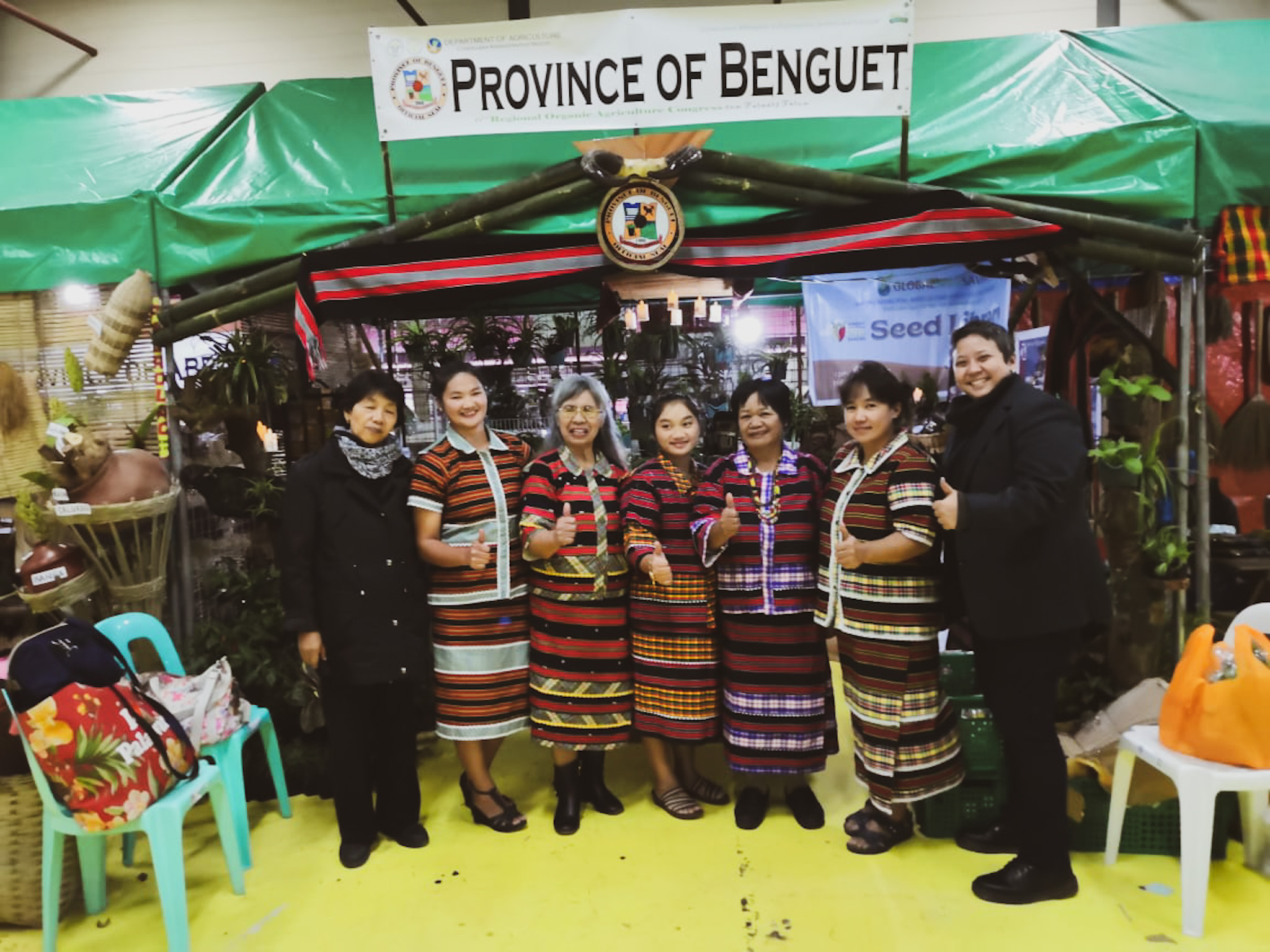
Karen with Tublay Citizens at Province of Benguet Gathering
Christopher Bolden-Newsome, co-founder of Truelove Seeds, had this to say about seed saving as a vehicle of culture preservation[12]https://www.sierraclub.org/sierra/preservation-culture-begins-seed: “The idea of keeping seeds wasn’t specifically about keeping seeds…It’s that the seed is a vehicle, the seed is the holder, the seed is a container which holds the culture that I need to preserve. . . . I think our seeds and the agricultural knowledge around [them] has to be defined by us. We have to pick it up and then keep searching to find the parts of it that are our own expression and rely less on what’s been collected by academics.”
For us here at Global Seed Savers, seeds carry with them the past, present, and the future. By saving seeds, we ensure that the best lessons of the present are passed on to be improved by future generations. It is our weapon for enabling farmers to re-member their sacred calling: nourishing the body and bringing the stories of past generations forward into the future.
Philippines Address
Our local staff work remotely
from various parts of the Philippines (Benguet, Cebu).
To contact our Philippines team, fill up this contact form.
US Address
Located at
The Posner Center
for International Development
1031 33rd Street, Ste. 174
Denver, CO 80205
info@globalseedsavers.org
Our US offices are based in Denver, Colorado, which is the land of the Cheyenne and Arapaho and 48 other Indigenous Tribes and Nations who call Colorado home. They are the original Stewards of this stolen land and it is because of their successes and continued hardships that we are able to engage in our collective work of restoring the indigenous practice of saving seeds.
